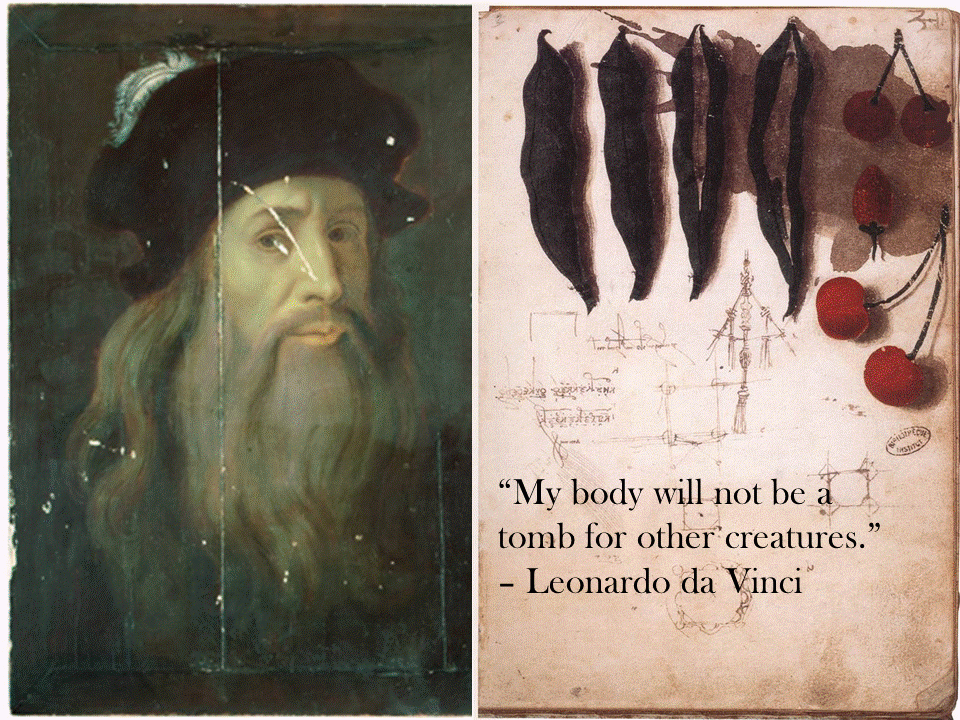Leonardo da Vinci, A 15th Century Animal Rights Activist and Vegetarian
"Of Sheep, Cows, Goats, and other animals, 'Endless multitudes of these will have their little children taken from them ripped open and flayed and most barbarously quartered.'”
 Artist and Renaissance man, Leonardo da Vinci (1452 – 1519), may have lived over five centuries ago, but he was ahead of his time defending animal rights, questioning the superiority of humans to animals, and decrying the evils of eating meat, drinking milk, and even harvesting honey from a comb. What is well known about Leonardo is that he was a brilliant painter, sculptor, architect, inventor, and military engineer, but what is less well known is that he was a highly moral, ethical, compassionate man who was a devout vegetarian and was passionately opposed to the taking of an animals’ life for meat or to eat.
Artist and Renaissance man, Leonardo da Vinci (1452 – 1519), may have lived over five centuries ago, but he was ahead of his time defending animal rights, questioning the superiority of humans to animals, and decrying the evils of eating meat, drinking milk, and even harvesting honey from a comb. What is well known about Leonardo is that he was a brilliant painter, sculptor, architect, inventor, and military engineer, but what is less well known is that he was a highly moral, ethical, compassionate man who was a devout vegetarian and was passionately opposed to the taking of an animals’ life for meat or to eat.
Da Vinci wrote that he could not abide any suffering inflicted on animals or the horror of man inflicting any pain on them. He refused to consume animals or any animal products and his vegetarian diet was acknowledgement that he recognized the cruelty in eating meat and dairy. In a letter by Andrea Corsali’s to Giuliano de’ Medici, he says, “Certain infidels called Guzzarati [Hindus] do not feed upon anything that contains blood, nor do they permit among them any injury be done to any living thing, like our Leonardo da Vinci.”
In Leonardo da Vinci Artist, Thinker, and Man of Science (1898), Eugene Muntz wrote, “It appears from Corsali’s letter that Leonardo ate no meat, and lived entirely on vegetables, thus forestalling modern vegetarians by several centuries.”
In Leonardo: Discovering the Life of Leonardo da Vinci (English translation 1991), Serge Bramly wrote, “Leonardo loved animals so much, it seems, that he turned vegetarian.”
In The Mind of Leonardo da Vinci (1928), Edward MacCurdy wrote, “… The mere idea of permitting the existence of unnecessary suffering, still more that of taking life, was abhorrent to him.”
In a letter to his patron Giuliano de’ Medici, he refers to “our Leonardo da Vinci” as someone who refused to eat meat.
In the book Codex Atlanticus, Leonardo condemns the immorality of eating meat and drinking milk, when he says,
“Of Sheep, Cows, Goats, and other animals, ‘Endless multitudes of these will have their little children taken from them ripped open and flayed and most barbarously quartered.’”
In Codice Atlantico 76, you can find a statement expressing the immorality of eating animals,
“Man and the animals are merely a passage and channel for food, a tomb for other animals, a haven for the dead, giving life by the death of others, a coffer full of corruption.”
And from Leonardo’s own Notebooks, he wrote:
“If you are as you have described yourself the king of the animals –– it would be better for you to call yourself king of the beasts since you are the greatest of them all! –– why do you not help them so that they may presently be able to give you their young in order to gratify your palate, for the sake of which you have tried to make yourself a tomb for all the animals? Even more I might say if to speak the entire truth were permitted me.”
He was so passionate about animal rights and not causing any cruelty or abuse to animals that Leonardo can be seen in a picture releasing a bird from its cage, that he had just bought at the market, while surprised bystanders look on. In a book written by Giorgio Vasari (1511-1574) about hundreds of artists entitled Lives of the Most Eminent Italian Architects, Painters, and Sculptors, that he first published in 1550, Vasari writes that Leonardo so loved animals that he bought caged birds sold in Italy at that time as food, as well as pets—and simply to let them go.
Long before such ideas were widespread, let alone fashionable, Leonardo defended the rights of animals. Animal rights is a repeated theme in his notebooks, and he writes that humanity is not “king of the animals” but merely “king of the beasts”, and that we are a more powerful beast than non-human animals, and he goes on angrily and rebuking that we use our power to raise animals for slaughter and to eat.




























